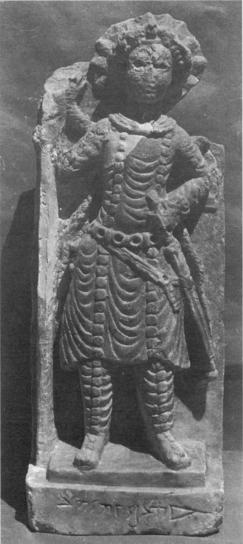Statuette of the Parthian God Zqyq’, Hatra, Iraq, c. 2nd century A.D., before 241. |
Statuette of the Parthian God Zqyq’, Hatra, Iraq, c. 2nd century A.D., before 241. |
The second statue is more problematic than that of Gnd’. It throws fresh light on a very enigmatic, and at the same time minor, god at Hatra. The statue is 50 cm high including the base, which is 4 cm high and 18 cm wide. The figure stands on another very low statue-base, which is 1.5 cm high (Fig. 3). The upper part of the statue is weathered and the left corner is missing. The figure stands frontally with his weight borne on the right leg, while the left is slightly bent at the knee. The face is damaged, and the features are not easily distinguishable. The inlays of the eyes are lost; they were probably made of ivory, with either stone or metal for the pupils. The hair, made of snail-shell curls, is arranged around the face. The figure wears a pair of horns over the forehead, and a diadem on which stands a small eagle. Behind the head is a radiate disc made of thirteen rays, which are carved in relief. A deep groove separates the head from the halo. Around the neck, the figure wears a short necklace similar to that worn by Hercules-Gnd’. It is composed of three parallel bands with a round ornamentation in the centre.
The figure wears a long-sleeved knee-length tunic and trousers. The tunic is adorned with two parallel rows of large discs, which continue down the front of the trousers and on to the shoes. The folds of the drapery are made of schematically carved short incisions. In the left hand the figure grasps the hilt of a sword which hangs down on his left side. Around his left wrist is a bracelet decorated with a round gem in the middle. He wears a belt composed of alternating round and rectangular ornamentations. He raises his right arm laterally, holding in his hand a long staff, the lower end of which rests on the ground. The staff is connected to the background by means of a continuous support. Its upper end is destroyed. Behind his right shoulder appears a snake, with its head turned towards the god and its mouth slightly open, revealing a set of teeth. The rest of the snake’s body is depicted writhing on the figure’s right side. A similar snake is also shown on his left side, but it is incomplete because the upper right side of the statue is missing.
Apparently the figure was inlaid in certain places with different-coloured stones or gems, for there are holes near the ears for fixing ear-rings, and the hollowed round discs of the belt would have been ornamented. There is also a hole on the sling of the sword and another close to the left hand. These holes bear traces of cement for fixing the missing gems. The god wears a common Hatrene costume. However, it is identical in type and rendering to that worn by Brmryn, as carved on a small relief found behind the temple of Šmš.13 The rearing serpent which springs up14 from his shoulders also occurs on the well-known “Cerberus relief”. There a number of variegated forms of serpents is shown, among which is a pair of similarly rearing serpents emerging from behind the shoulders of the central figure. However. the iconographic similarities are not reflected in similar identities, as we shall see below.
On the statue base an Aramaic inscription is incised, with traces of red paint still visible. It reads šm‘ny zqyq’, “Hear me Zqyq’!”
The name Zqyq’ definitely refers to the portrayed figure, and the invocation shows that he is certainly a god. An inscription [13] found in Nergal’s shrine (I) mentions that a certain person should be remembered before Zqyq’.15 and in that case, too, he is considered a divinity. On a stele found in the shrine of Gnd’ (XIII), the name Zqyq’ is recorded on the base and refers to one of the two male gods carved in relief.16 Other documentary evidence mentioning the god is confined to one theophoric name, Brzqyq’.17
Source: "Two Cult-Statues from Hatra" by Wathiq I. Al-Salihi1 in Iraq Vol. 58 (1996), pp. 105-108